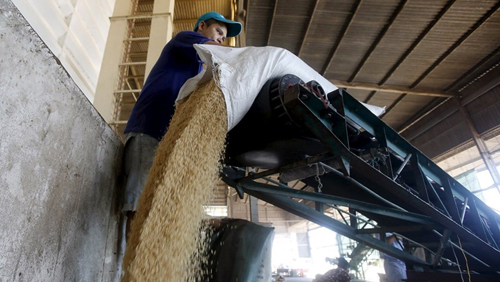Economists blame lack of policy reforms to benefit from FTAs
Sunday, 10:30, 30/08/2015
Though the government seeks to globally integrate Vietnam -- 15 free trade agreements signed since 2007 -- its tardiness in reforming policies is preventing businesses from benefiting from the FTAs, delegates said at a recent economic forum in the central province of Thanh Hoa.
They were speaking in defense of businesses who are often accused of being "clueless" about FTAs and failing to use those trade deals to their advantage.
Nguyen Dinh Cung, chief of the Central Institute for Economic Management, said what matters is whether government policies can enable the whole economy to participate in the integration.
The government system has remained unchanged for the past 30 years, meaning that they manage and control businesses by setting up barriers instead of acting as their companion, he said.
As a result, Vietnamese businesses find it hard to survive right in their home environment, let alone in overseas markets, Cung said.
Economist Vo Dai Luoc also complained about the government's sluggishness in reforming business policy, saying Vietnam's competitiveness has yet to catch up with its eagerness for integration.

Dau Anh Tuan, chief of legal affairs at the Vietnam Chamber of Commerce and Industry, told the forum delegates that a main reason for Vietnamese businesses' failure to take the opportunity brought by FTAs is the lack of information and instructions.
Poor awareness
Former trade minister Truong Dinh Tuyen quoted recent surveys as saying that 76% of businesses polled do not know that the ASEAN Economic Community will be established this year.
Even though the community's establishment will enable free flow of goods among its members, 62% of respondents believed the event would not affect them, he said.
Tuyen pointed out that though Vietnam has been in ASEAN for 20 years, as of last year only 25% of its exports to other members had certificates of origin which allowed them to receive tax breaks.
"It is a sad fact showing Vietnamese businesses' poor awareness and understanding about economic integration," he said, adding that even officials are only "vaguely" aware of the subject.
Economist Le Dang Doanh said Vietnam's ignorance about FTAs also means that it fails to set up protection against the flow of foreign goods and services while its partners in the agreements often make good preparations by setting up different barriers to limit the flows.
Though Vietnam's economy is forecast to grow by more than 8% when the Trans-Pacific Partnership, a US-led FTA involving 12 nations, is signed, the expectation is possibly premature, he said.
The forecast is based on the assumption that all Vietnamese businesses would be able to bypass barriers set up by other signatories, while in fact only half possibly would, he added.
